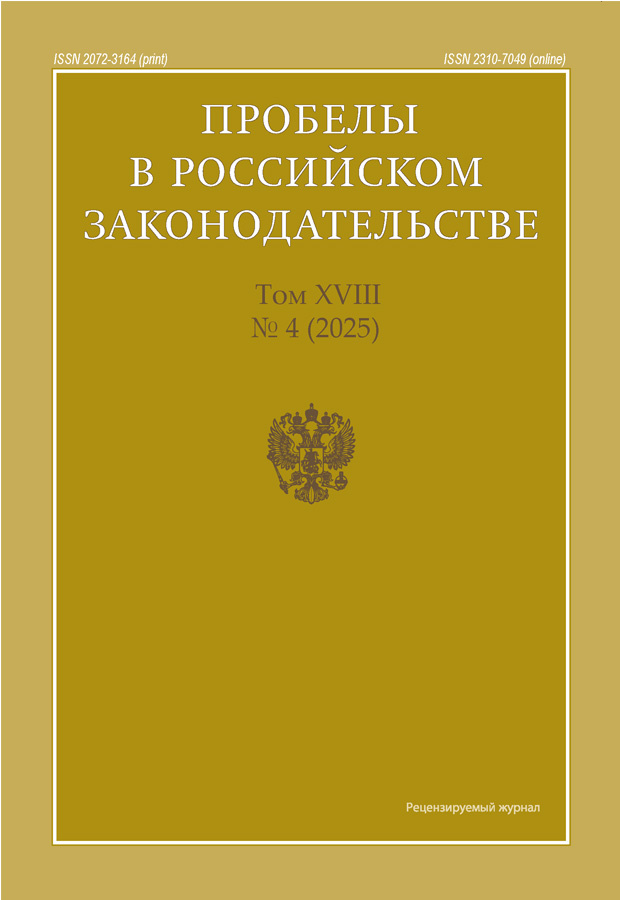Criminological portrait of a cybercriminal: domestic and foreign experience
- Authors: Akvit V.S.1, Baslueva N.N.1, Bashlueva M.А.1
-
Affiliations:
- Moscow Regional Branch of the Moscow University of the Ministry of Internal Affairs of Russia named after V.Ya. Kikot
- Issue: Vol 18, No 4 (2025)
- Pages: 138-142
- Section: Criminal Law Sciences
- URL: https://journals.eco-vector.com/2072-3164/article/view/689460
- DOI: https://doi.org/10.33693/2072-3164-2025-18-4-138-142
- EDN: https://elibrary.ru/MUJFLW
- ID: 689460
Cite item
Abstract
The study focuses on criminological and psychological characteristics shaping the portrait of a cybercriminal in the context of digital transformation. The aim is to identify universal and nationally specific traits of offenders in cyberspace through comparative analysis of Russian and international experience. Relevance stems from the exponential growth of cybercrime (up to 25% annually according to Russian MVD data) and its transnational nature. It is established that 68% of cybercriminals are individuals under 35 with advanced technical skills but reduced socio-ethical competencies. The conclusions emphasize the need for proactive criminological models integrating artificial intelligence for behavioral forecasting.
Full Text
About the authors
Viktoria S. Akvit
Moscow Regional Branch of the Moscow University of the Ministry of Internal Affairs of Russia named after V.Ya. Kikot
Author for correspondence.
Email: akvit.vs@yandex.ru
SPIN-code: 7588-5079
teacher of the Department of Socio-economic and humanitarian disciplines
Russian Federation, MoscowNatalia N. Baslueva
Moscow Regional Branch of the Moscow University of the Ministry of Internal Affairs of Russia named after V.Ya. Kikot
Email: bashlueva@mail.ru
SPIN-code: 1147-2621
Cand. Sci. (Ped.), Assoc. Prof., Associate Professor of the Department of Socio-Economic and Humanitarian Disciplines
Russian Federation, MoscowMaria А. Bashlueva
Moscow Regional Branch of the Moscow University of the Ministry of Internal Affairs of Russia named after V.Ya. Kikot
Email: rinkarikam@yandex.ru
SPIN-code: 1169-7845
Cand. Sci. (Ped.), Senior Lecturer at the Department of Organization of Road Safety Activities
Russian Federation, MoscowReferences
- Federal Law No. 187-FZ dated July 26, 2017 "On the Security of Critical Information Infrastructure"
- Cybercrime statistics in the Russian Federation 2023–2024. Official Portal of the Ministry of Internal Affairs of Russia. URL: https://мвд.рф/reports (date of access: 07/25/2025)
- Dozortseva E.G. Digital deviantology: personality transformation in the cyber environment. Moscow: Research Institute of the Federal Penitentiary Service, 2024.
- Criminology: a textbook for universities. edited by V.D. Malkov. Moscow: Justice, 2025.
- Interpol Global Crime Trend Analysis 2025. Lyon: ICPO.
- Cyber threat monitoring GosSOPKA: report for 2024. Moscow: NCCCI, 2025.
- Shaw J. The Psychology of Cybercrime: Motivations and Typologies. Cambridge University Press, 2024.
- Aminev G.A. Psychology of a cybercriminal: methodology of virtual profiling. Kazan: KSU, 2023.
- The cybercrime investigator’s workbook. edited by A.I. Ushatikov. Moscow: Prospekt, 2024.
- Chen H. Cybercriminal Networks: Lessons from Chinese Hacking Groups. Journal of Cybersecurity. 2024. Vol. 10(2). (in Rus.).
- Kaspersky Security Bulletin 2024: statistics of attacks on CII facilities.
- Europol Internet Organised Crime Threat Assessment (IOCTA). 2025.
- Mokhov V.A. Criminalistic characteristics of crimes in the field of cryptocurrencies. Bulletin of Criminalistics. 2023. No. 4(52). (in Rus.).
- Soldatova G.U. Psychology of digital socialization. Moscow: Neolit, 2025.
- FBI Cyber Division Annual Report 2024. Washington: U.S. Department of Justice.
Supplementary files









